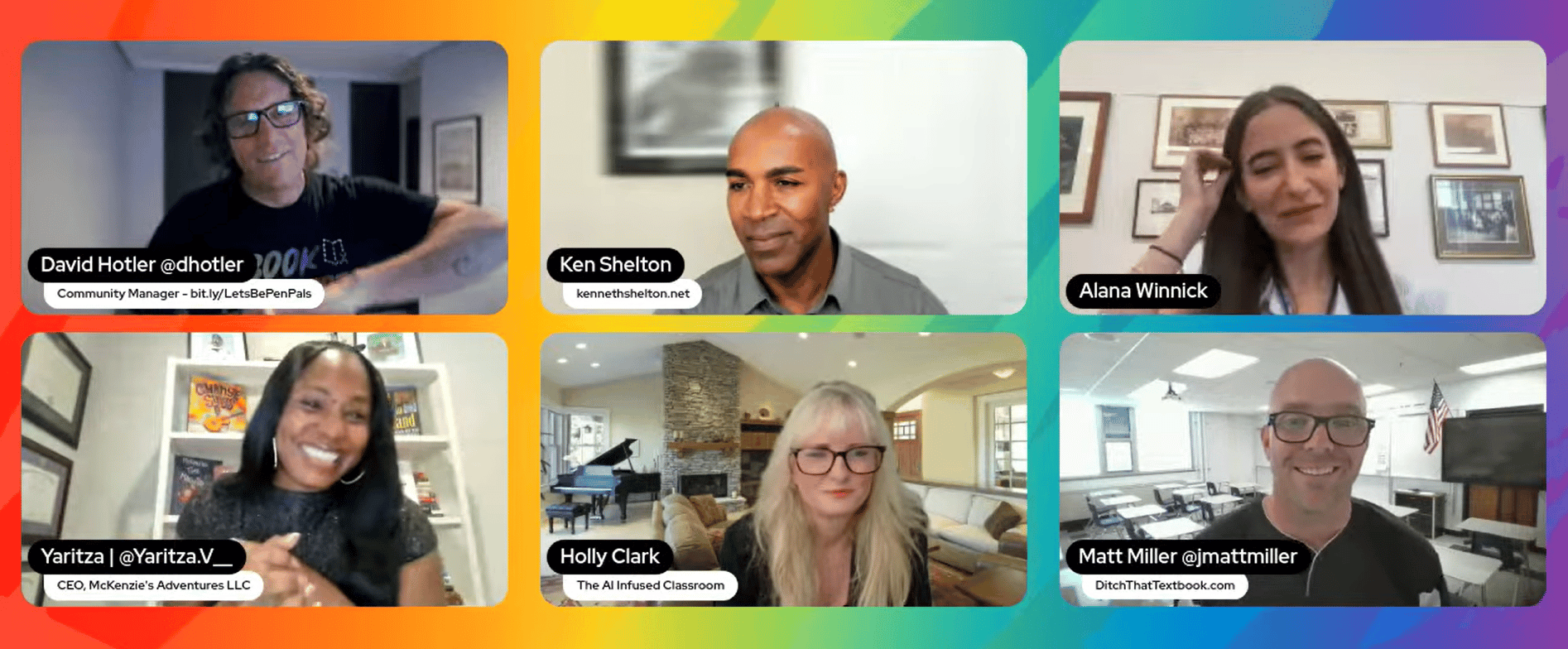
I’m about a month and a half into the school year, and I’m still trying to settle into a routine while teaching in the classroom.
Before the school year started, I thought … “Oh, one class period a day. Just 45 minutes. That won’t change much in my life.” Ha … boy was I wrong!
It involves 20 minutes of driving to school. Teaching for 45 minutes. Planning and grading afterward. And if I want to go back home to work on my writing/speaking/consulting work, it’s another 20 minutes home. (Which is silly if I have to come back to the school that evening for one of my kids’ volleyball or tennis matches!)
I often spend the rest of the day in my “satellite office” — my classroom. Thankfully, the room isn’t assigned to another class or teacher and it’s free for the rest of the day.
It does mean that I’m not working on these newsletters until after I’m done teaching, so I’ve been getting them out later and later.
But good news — when I do a webinar (as I did with Book Creator recently for AI Literacy Week), everyone gets to see my classroom in the background. 😁
In today’s main section below, I’ll share some of my key takeaways from the recent AI literacy panel discussion — with a link to watch the whole thing!
PS: If you have a moment, check out this week’s poll and vote! I love featuring reader voices like yours in the “Your Voice” section … so add a comment to your vote and you might see comment in next week’s newsletter!
In this week’s newsletter:
📚 Book coming: AI Literacy in Any Class
📚 New AI resources this week
📢 Your voice: School/district AI policy update
🗳 Poll: Biggest AI barriers
🗝️ 10 keys to meaningful AI literacy
📚 Book coming: AI Literacy in Any Class
I don’t even have an image for this yellow box … because I still am not close enough to completion to have a cover for the book yet!
Just wanted you to know that I’m hard at work on my new book, AI Literacy in Any Class. (Working title … could still change!)
In it, I’ll share some of the ways I’ve incorporated AI literacy into my own high school Spanish class — and how any teacher of any grade level and subject area can do the same.
Why? When students improve their AI literacy, they’re better prepared for the future … but they also know how to handle their business and be responsible in today’s AI-integrated world.
AI literacy isn’t just for the tech teachers and computer science classes.
It’s up to all of us. We can all help prepare students …
… and it can even strengthen how we teach the content in our own classes.
(Have I piqued your interest?!? Hit reply and let me know what you think — or if you have any questions!)
📚 New AI resources this week
1️⃣ More Schools Are Considering Education-Focused AI Tools. What’s the Best Way to Use Them? (via EdSurge) — A new report shows AI teaching assistants could be beneficial in the classroom, but may also carry invisible bias.
2️⃣ Which States Require Schools to Have AI Policies? (via EdWeek) — Putting guardrails in place for this fast-changing technology is not easy
3️⃣ AI Training Options Open the Door to Purposeful Tech Integration in K–12 Schools (via EdTech Magazine) — Partnerships are allowing organizations to train teachers and school leadership on artificial intelligence possibilities in education.
📢 Your voice: School/district AI policy update
Last week’s poll: What is your school/district's progress on creating AI policy?
🟩🟩🟩🟩🟩🟩 We have comprehensive board-approved policy (21)
🟨🟨🟨🟨⬜️⬜️ We have some policy but nothing comprehensive (14)
🟨🟨🟨⬜️⬜️⬜️ Drafting policy / policies now (11)
🟨🟨🟨⬜️⬜️⬜️ Still no discussions or progress yet (11)
⬜️⬜️⬜️⬜️⬜️⬜️ Other ... (2)
Still no discussions or progress yet: Our district is gigantic. Schools were just told that we will have to make our own AI policies. The district has created guidelines for students and staff, but will not create a policy for all of us to follow. Ugh. — Bronwyn T.
Other: I counseled my former district to not create a formal board policy. Board policies are difficult to change (multiple readings, multiple votes, etc). This technology was/is changing too fast. A board policy regarding AI written today may need changes in a few months. Instead of a board policy, we created an administrative rule that could be continually updated but provided guidance for teachers. — Mickie M.
Comprehensive board-approved policy: aaa When I read it, it seems like a basic CYA verbiage from school lawyers. I disagree with parts of it, and agree in other areas. I was upset to learn about this on my own with NO WORD from district leadership to me (as the technology integrator), nor word to teachers that this occurred. […] Thankfully, I had already been in pretty regular communication with teaching staff about AI, and even had the opportunity to be a guest speaker to every English class at the high school level (8-12) about ethical and responsible use of AI way before policy adoption. […] All of that aside, I am of the belief that a policy should exist, and that it should be written in a way (broad enough) to not need yearly revisions. That is extremely difficult to do. — Crystal Blais
What would you like to read in AI for Admins?
What’s a topic you’d like to see covered here? Hit REPLY to this email and let me know.
Have you done anything you’d like to share with the AI for Admins community? Hit REPLY and let me know.
Would you like to write a guest post to support and equip AI for Admins readers? Hit REPLY and let me know.
🗳 Poll: Biggest AI barriers
Instructions:
Please vote on this week’s poll. It just takes a click!
Optional: Explain your vote / provide context / add details in a comment afterward.
Optional: Include your name in your comment so I can credit you if I use your response. (I’ll try to pull names from email addresses. If you don’t want me to do that, please say so.)
What’s the biggest barrier your school/district faces related to AI?
🗝️ 10 keys to meaningful AI literacy

This AI literacy panel (hosted by Book Creator) was phenomenal!
When Book Creator told me they wanted to host a panel discussion on AI literacy, I was interested.
When they told me I’d get to join Ken Shelton, Holly Clark, Yaritza Villalba and Alana Winnick, I was pumped! These are voices I respect with solid perspectives on AI and meaningful student learning.
The panel was so good. The questions were spot-on and the insights I gained were so valuable.
(I even got busted for having my microphone on when the bell rang in my classroom before the panel even really began.) 😂
Here are 6 key takeaways from the panel discussion, which you can watch in full here. (Plus, you can grab the AI Literacy Week resources here.)
1. Access is foundational before discussing AI deeply.
In a question about equity, I said: before we can start talking about AI apps and initiatives, we have to make sure that the infrastructure is in place for everyone to have access. In my rural community, the biggest need is access to broadband internet. If not everyone has equitable access, then the classwork we assign — and the things students can do with apps and tools — instantly becomes inequitable. I added this: access doesn’t mean “you can go to McDonald’s” or “you can go to the public library.” Many times, those aren’t effective learning environments and only further create a digital divide.
2. Bring students into the conversation.
Alana Winnick talked about students she knew with learning differences (i.e. dyslexia). They’re using certain AI tools in certain ways to support their learning and level the playing field. “When you hear a child talk about how it helps them as learners, now every teacher that heard them is like, OK, I need to step up.” Because those students have expertise, use them as experts to share their perspective and help to make decisions.
3. Consistency is key.
Alana Winnick painted the picture of students who have certain guidelines, rules, and expectations in one classroom … and then have to walk across the hallway and have completely different expectations in a different classroom. (That also is inequity and creates a digital divide, Ken Shelton later added.) That starts small, from academic integrity and what’s expected on assignments. But it also goes to bigger things, like district/school/classroom-level guidelines. Clearly defining what’s acceptable on assignments is crucial — especially when expectations may change from assignment to assignment.
4. How do you define AI literacy?
Ken Shelton pointed out the importance of being clear on your AI literacy definition. If you think it’s one thing — and others see it differently — you might be talking about two completely different concepts. “You can’t expect educators, students, adult caregivers to fully contextualize what your purpose is and your context is when you’re using AI if you don’t have a definition of AI literacy,” he said. And this doesn’t mean you have to go online to find someone else’s definition, he said. You can create your own. Once you have a definition, then you can start to talk about policies that support it.
5. Teachers need support at all levels.
For some teachers, they need support moving from AI literacy to AI fluency. It’s fine for teachers to be AI literate, Holly Clark said. But eventually, they need to move to AI fluency. For other teachers, they need someone to support them when they’re scared about the implications of this new technology. That’s where it’s incumbent upon districts to empower coaches to support those teachers. And for all teachers, they need to see student-centered examples of how AI can be used to support learning. It can’t just be teacher-driven “sage on the stage” work.
6. Move beyond functional skills.
In this discussion about AI fluency, Ken Shelton added this: Often, fluency gets overlooked because we tend to prioritize functional skills rather than critical thinking skills. It’s so easy for us to bring up a tool and talk about all of the features and what the buttons do. But if we want to implement them well — and know when to use them and when not — and how to use them responsibly — we need to move beyond just the functional skills of what the technology does to the critical thinking of how it should be used.
Watch the whole panel discussion
This entire panel discussion is available as part of Book Creator’s AI Literacy Week festivities. They graciously hosted and provided this panel discussion to watch free of charge.
I hope you enjoy these resources — and I hope they support you in your work!
Please always feel free to share what’s working for you — or how we can improve this community.
Matt Miller
Host, AI for Admins
Educator, Author, Speaker, Podcaster
[email protected]

